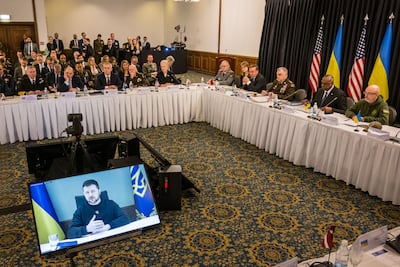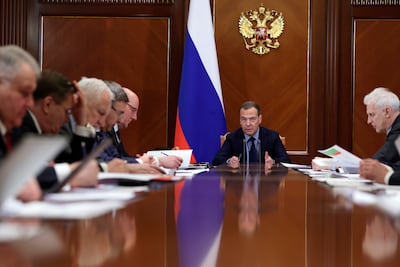The Nato-Russia confrontation is increasing in intensity, and fast approaching a turning point that could make it even more dangerous. The escalation is following a military trajectory, underscored by meetings convened this week by top generals from Nato and Ukraine, amid terrifying remarks being made by Russian leaders about possible "nuclear options".
Today, close to the one-year anniversary of the start of Moscow's full-scale invasion, there are few signs of hope for a political solution. Rather, what's been a proxy war so far could transform into direct conflict. In seeking to back the other into a corner, both sides may have backed themselves into a corner, making it impossible for either of them to back down.
Dmitry Medvedev, Deputy Chairman of the Russian Security Council, put it bluntly, when he said: “The defeat of a nuclear power in a conventional war may trigger a nuclear war." Commenting on Nato support for the Ukrainian armed forces, he added: “Nuclear powers have never lost major conflicts on which their fate depends." The Kremlin confirmed that Mr Medvedev’s remarks were consistent with Moscow’s nuclear doctrine.
Western leaders have previously discounted such remarks from the former Russian president. They might even ignore the remarks made by Ramzan Kadyrov, head of the Chechen Republic, who said: “Russia will never allow itself to lose in any confrontation, and it can press the button, and peace be upon you.” Mr Kadyrov, whose forces are fighting alongside the Russian army, was obviously referring to nuclear weapons.
Indeed, western leaders seem confident – in varying degrees – that Moscow wouldn't dare use nuclear weapons in the war, believing this would lead to the defeat of its army and even bring down its regime. They are confident it will eventually back down. But Russian President Vladimir Putin isn't known to back down, in which case might they be mistaken?

Why is the current round of escalations more dangerous than previous ones? First, there is a concerted effort in the West to seek unprecedented aid for Ukraine, including tanks, missiles and other military hardware that could enable Kyiv to launch attacks on Russian territory. Moscow views these weapons, especially long-range weapons, as provocative.
Further, Washington has now added Crimea into the military equation, knowing that this would rile up the Kremlin. Ukraine President Volodymyr Zelenskyy reaffirmed his country's aim to restore Crimea, which Moscow annexed in 2014. Addressing western audiences, Mr Zelenskyy said: “Our objective is to liberate all of our territories … Give us your weapons and we will bring our land back." Washington agrees and believes Crimea would change the dynamics of the war and has urged new weapons shipments to Ukraine to this end.
The UK, through its defence secretary and military intelligence, has not only pledged to send armoured vehicles and thousands of missiles and ammunition to Ukraine, but also revealed efforts by Nato states to train Ukrainian soldiers. London has revealed that Moscow is deploying its new T-14 Armata battle tanks but, perhaps as part of psychological warfare, said that this decision was associated with risks for Russia in terms of production delays and the size and weight of these tanks.
Nato’s strategic push for more logistical support for Ukraine will pose a significant challenge for Russia. By mid-March, Ukrainian soldiers who have completed their training in the West, will return with new equipment and strategies that impose a new situation for the Russian army. This month, Ukrainian Parliament passed legislation allowing foreign citizens to fight alongside the army.
Last week's summit involving Nato chiefs of defence has brought a combination of alarm and renewed belligerence in the Russian political and military ranks. And as the war enters a new phase, there is talk within Russian circles about possible preventive measures.
"Preventive strikes" – meaning the nuclear option – are now being seriously considered. The conversation is no longer limited to tactical nuclear strikes exclusively in Ukraine. Rather, both the geography and scale of the nuclear options have expanded. I am given to understand that recent Russian remarks about the Poseidon Super Torpedoes are not a coincidence.

Some experts say these nuclear-capable torpedoes can generate tsunamis once they hit Nato countries such as the US and UK. Mr Putin first revealed them in 2018, claiming they were a new type of strategic nuclear weapons that no defence system in the world could intercept. They have also been described as doomsday weapons. Last week, Moscow announced production of the first batch, to be deployed onboard the Belgorod submarine. But is all this a bluff, or is it really a step towards executing a nuclear preventive strategy?
Nato members don't appear to be intimidated by the prospect of direct conflict with Russia, betting perhaps on a fear of consequences in Moscow. All this escalation could also be just a new peak in the war, to be followed by ceasefire negotiations and political settlements. But for now, it appears unlikely as the space for negotiations narrow and the space for warfare expands.
Of course, the West doesn't underestimate Russia's capabilities. It is also factoring in the regional actions of Moscow and its allies. For this reason, US diplomatic movements in the Middle East this week included efforts to hedge against Iranian adventures and Israeli initiatives, seeking to ensure that the situation remains calm in countries such as Iraq.
According to a White House statement, US National Security Adviser Jake Sullivan discussed with the leaders of Israel “Ukraine, as well as the burgeoning defence partnership between Russia and Iran and its implications for security in the Middle East region". Mr Sullivan stressed that the US would never allow Iran to acquire nuclear weapons.
For his part, Brett McGurk, the US co-ordinator for the Middle East and North Africa, led a large delegation to Iraq, holding the first meeting of its kind with Prime Minister Mohammed Shia Al Sudani, who despite being backed by Iran, recently stated that his country needed continued US troops presence in Iraq. Bear in mind that the Co-ordination Framework, the governing coalition backing Mr Al Sudani, has a different position that echoes Tehran’s call for US troops to leave, underscoring the importance of his diverging position. The US delegation did not hesitate to call for stopping Iraqi funds from being diverted to Iran.
All surprises are possible in the Ukrainian Pandora’s box. This war portends further non-traditional, "pre-emptive" and "preventive" strategies, which until recently were considered unlikely.


